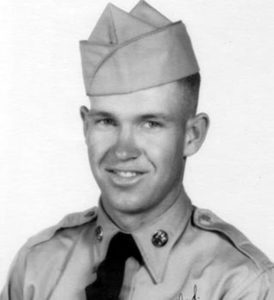 The Korean War, a military struggle fought on the Korean Peninsula started in June 1950. This conflict between South Korea and North Korea swiftly developed into a limited international war involving the United States and 19 other nations. Lee along with all eighteen-year-old males was required to register for the draft and it was no surprise that at nineteen he received a letter asking him to report to Fort Douglas for induction into the Army. It was a day mixed with emotions as Lee took the bus to Fort Douglas that 22 day of April 1953. Lee’s parents like other parents faced with the possibility of losing their sons on the battlefront prayed that day for their son’s safety and well being. After reporting into the Army at Fort Douglas, Lee went to Fort Ord and then to Camp Roberts for 16 weeks of training in Heavy Weapons. Oct 26, 1953 he sailed for overseas duty and wrote the following letter to his Grandma Kimber while on the ship before docking in Japan where he spent Thanksgiving and Christmas. 14 Nov. 1953
The Korean War, a military struggle fought on the Korean Peninsula started in June 1950. This conflict between South Korea and North Korea swiftly developed into a limited international war involving the United States and 19 other nations. Lee along with all eighteen-year-old males was required to register for the draft and it was no surprise that at nineteen he received a letter asking him to report to Fort Douglas for induction into the Army. It was a day mixed with emotions as Lee took the bus to Fort Douglas that 22 day of April 1953. Lee’s parents like other parents faced with the possibility of losing their sons on the battlefront prayed that day for their son’s safety and well being. After reporting into the Army at Fort Douglas, Lee went to Fort Ord and then to Camp Roberts for 16 weeks of training in Heavy Weapons. Oct 26, 1953 he sailed for overseas duty and wrote the following letter to his Grandma Kimber while on the ship before docking in Japan where he spent Thanksgiving and Christmas. 14 Nov. 1953
Dear Grandma, “ Well we reached our first destination this morning. We are still on the ships outside the docks of Sasebo, Japan. They woke us up this morning at 2:00 and then at 8:00 they notified us that there would be no debarkation. I don’t care if we stay on board ship for the rest of my time in the army, but we will probably get off tomorrow. We will be here for a few days and then on to Korea. If you have been writing to that address I sent I should have some mail here at Japan. Send your letters airmail so it doesn’t take so long to get them over here. Tell everyone to write. I will try to answer their letters. I will write and tell you how things are in Korea. Hope your birthday party was a success. Did you have a big crowd? Write,” Lee.
After receiving training in chemical, biological and radiological warfare in Japan during a three week stay, Lee went on to Korea for eleven months and then to Schofield Barracks in Hawaii for six months. Just shortly after he left for the service the Allies and Communists resumed full-scale truce talks at Panmunjorn. The Communists finally gave in to the UN demand that no prisoner should be returned to his homeland against his will. A truce agreement was signed on July 27 1953. In the 37 months of fighting of the Korean War there was an estimated 1,000,000 civilians killed with a cost to the US of $ 18,000,000,000. Lee luckily did not have to use his training against the enemy but instead was picked to be one of four members of the Color Guard Unit practicing and performing daily. On 10 December 1954 he received the following letter of appreciation for his services.
Pfc. Lee H. Kimber US 56213548,
- I take this opportunity to express my sincere appreciation and to commend you on the superior manner in which you performed your duty as color bearer at the reception given in honor of Major General and Mrs. Herbert B. Powell on 28 November 1954 at the Schofield Barracks Officers’ Open Mess.
- Your task, requiring both poise and perseverance, was accomplished with dignity and fortitude. The splendid appearance presented by you and the other members of the color guard prompted many favorable comments from the guests and added an air of dignity to the reception which otherwise could not have been attained.
- I am distinctly proud of your fine performance of duty and highly pleased by the credit it has reflected on yourself and the 14th Infantry Regiment. Signed Lloyd M. Marr. Colonel, Inf Commanding.
Another color guard member Bob Lee from Parma Idaho became a very good friend to Lee and after leaving the service they kept in touch with each other for many years. Lee received an honorable release from the army on March 24, 1955.
